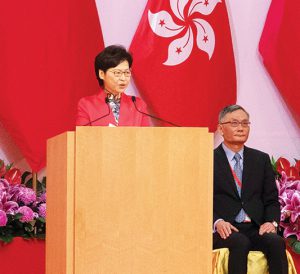Bloomberg
Hong Kong’s leader Carrie Lam touted plans to revive a controversial security law that ignited a political firestorm two decades ago, after completing an election to install a new legislature filled with Beijing loyalists.
The pro-establishment council elected in a muted vote should present “new proposals†by June on how to enact security legislation, Lam told a news briefing, after the results were announced. While the former British colony recorded its lowest-ever voter turnout — 30.2% — as swathes of the public boycotted the electoral system recently revamped by Beijing, the result empowers Lam to pass once-difficult legislation unopposed.
A provision of Hong Kong’s charter drafted before its return to Chinese rule in 1997 requires a law banning “foreign political organisations or bodies from conducting political activities,†as well as, “treason, secession, sedition, subversion against the Central People’s Government, or theft of state secrets.†Such legislation has been shelved since huge street protests in 2003.
Chinese authorities cited the failure to pass the “Article 23†legislation as justification for their decision to impose a national security law on the city in June 2020.
While that measure prohibited subversion, secession, colluding with foreign forces and terrorist activities, it lacked language on treason, sedition and theft of state secrets.
“It’s the constitutional responsibility of the SAR government,†Lam said, referring to Hong Kong’s status as a special administrative region. “For a long time, we haven’t done that.â€
Updated proposals were needed, Lam said, since the internet had brought new security threats and the “overall situation†of Hong Kong had changed since the last effort to pass Article 23. Lam, who hasn’t said yet whether she’ll seek a second term when her current five-year stint expires in June, was slated to leave for Beijing to brief state leaders on Hong Kong’s situation.
Lam stopped short of detailing a timetable for passing the legislation, saying it was “not realistic†to expect lawmakers to approve such a measure before their upcoming session ends six months from now. That said, the body has moved quickly on several major proposals in recent months with opposition members out of the chamber.
“Article 23 will likely be an extension of China’s national security standards and ways of doing things to Hong Kong,†said Kenneth Chan, associate professor at the Hong Kong Baptist University. “Having purged the democracy movement and civil society, it will be very hard for citizens to get organised to voice their opinions or oppose Article 23.â€
Lam said was she was “happy†with the election result, despite a government campaign to boost voting rates falling short. Free public transport saw the city’s network flooded as citizens inundated leisure attractions such as Ocean Park and Disneyland, rather than ballot boxes.
Authorities arrested 10 people for inciting others to cast blank votes before the election, and issued arrest warrants for at least five others on the same grounds, as they tried to protect voter turnout.
 The Gulf Time Newspaper One of the finest business newspapers in the UAE brought to you by our professional writers and editors.
The Gulf Time Newspaper One of the finest business newspapers in the UAE brought to you by our professional writers and editors.
